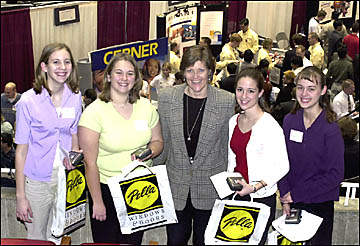|
|
|
|
|
|
INSIDE IOWA STATE March 1, 2002 Getting through to girls
It's official -- your daughter doesn't want to be Britney Spears when she grows up. Once you've breathed a sigh of relief, don't assume your job is done. Daughters in particular just may be getting short-changed when it comes to career exploration. Monica Bruning, director of outreach and recruitment for the College of Engineering, is in the business of convincing boys and girls to study at Iowa State. But when half of Iowa's college population are women, and less than 20 percent of ISU's engineering students are female, she wonders if some students simply don't hear the message. "I began thinking a lot about how young women's perceptions of careers develop, and in particular what they know about engineering," Bruning explained. "In many of the smaller Iowa communities, these girls may not even know any engineers. "I was amazed when I did an earlier pilot study on campus with very high-achieving girls here for six-week summer research internships (Program for Women in Science and Engineering, or PWSE). These were very strong science students whose impression of engineering still was sitting in a cubicle all day long plugging numbers into formulas." So in conjunction with her doctoral dissertation project, Bruning currently is conducting career exploration research with 10th-grade girls from Manning High School in western Iowa and Hoover High School in Des Moines. As part of their exposure to career opportunities, the girls attended the recent College of Engineering Career Expo in Hilton Coliseum, where they visited with dozens of professional engineers. Armed with tape recorders, the girls asked the tough questions. "They felt especially good about the conversations they had with female engineers," Bruning said. "They wanted to know if there is sexism in the workplace, and if they'll be able to take maternity leave and still have a career. Overall, they came away with the perception that engineering is very cool. "They just had no idea what all their options are," Bruning continued. "Their eyes have been opened up, and they're more curious now than ever. As one girl said, 'Everything is engineered.'" Bruning will continue to track the girls as they conduct research on specific companies and plan field trips to those sites. Job shadowing with engineers also may be an option for the research subjects. And throughout the process, they are recording their opinions and aspirations in journals. "I want the girls to ask themselves the tough questions like, 'Do I want a career in a field that is very nontraditional for women?'" Bruning said. Influences on girls She also is studying the career influences that exist among girls' peers, as well as inside their homes. "Research tells us that girls in particular look to their mothers for guidance in making career decisions," Bruning said. To that end, she is planning a "Mother-Daughter Camp" for summer 2003, geared to inform moms of career options and to aid girls in personal development and leadership skills. "Let's face it -- some moms are asking, 'Do I want my daughter to go into a fast-paced, rigorous field? If so, there go my grandchildren,'" Bruning said. "Positive encouragement within the family is important, and especially for girls." Bruning's interest in exposing girls to technological careers led to an invitation last fall to moderate a session at "A New Girl Order -- Young Women and the Future of Feminist Inquiry," an international conference held in London. That experience was a turning point for the long-time admissions professional. "I truly found my intellectual home there at the conference," Bruning said. "I've been a higher education practitioner for so many years, and now I'm learning all those underlying theories that have supported these systems. It was a great place in which to understand and learn from so many women scholars and researchers." Bruning's own career path started with a student-teaching stint at a private boarding school in Surrey, England. After graduating from North Dakota State with degrees in home economics and physical education, she was a substitute teacher in Minneapolis "until I got tired of all the discipline issues," she said. "I decided I wanted to work with kids who actually wanted to be at a school." She moved west, and spent the next 11 years working in admissions for the Western State College of Colorado, Gunnison. With the advent of the Internet, she became interested in technological career possibilities and joined the staff of Montana Tech of University of Montana, Butte. On her first day of work, she halted the production of the school's admissions viewbook because "it was painful to read," Bruning remembered with a laugh. "I was reading all this copy written by engineering professors, and all I could think was, 'How could any 17-year-old find this interesting?' And I've been saying it ever since -- we have to show these kids how engineering affects their lives and the things that mean the most to them. That's how we get them to become engineers themselves." |
|
Ames, Iowa 50011, (515) 294-4111 Published by: University Relations, online@iastate.edu Copyright © 1995-2001, Iowa State University. All rights reserved. |
